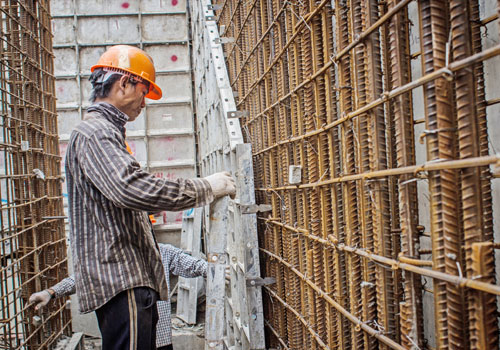 Four additional recommendations to the draft Condominium Law were debated in parliament earlier this week, as the upper and lower houses continue to tussle over details of the elusive bill.
Four additional recommendations to the draft Condominium Law were debated in parliament earlier this week, as the upper and lower houses continue to tussle over details of the elusive bill.
The Pyidaungsu Hluttaw’s Joint Bill Committee on November 18 submitted its report on the Condominium Law, which reviewed the existing 62 clauses and put forward additional proposals including on security standards, technology and car parking.
The committee stressed the importance of finalising the bill in the 13th Hluttaw session – it was first introduced to the Pyithu Hluttaw three years ago. Speaker Thura U Shwe Mann said anyone wanting to debate the bill further should register by November 20.
While it was expected to be passed in 2013, the draft remains in limbo. This has frustrated developers who have long pinned their hopes on the new rules, believing they will breathe life into the market, which has seen few sales since the start of the year.
Specifically they believe the sale of high-end condominium units would pick up if foreign investors were able to buy units, as expected under the new law.
However, the two houses have been unable to agree on a number of important points and the bill was passed to the joint committee earlier this year. The committee submitted its first report to the Pyidaungsu Hluttaw on May 11 and its second on May 27.
On June 3, it reported that the bill required further negotiation and after speaking with members of parliament, developers and the government, presented its third report on November 13.
The latest report includes four new recommendations, said U Saw Hla Tun of the committee.
The committee has approved the Amyotha Hluttaw’s definition of an apartment as “a place for living or using for other means under the approval of the executive committee”, over the Pyithu Hluttaw’s suggestion that an apartment should be “a place for living or doing business”.
On land ownership, it is in favour of the Pyithu Hluttaw’s idea that the land beneath a condominium should be deemed collective at the discretion of the landowner, rather than the Amyotha Hluttaw’s proposal that it should be split among apartment owners only with government approval.
The committee also decreed that a condominium should be defined as a high-rise residential building on more than 1 acre of land, casting its influence in a dispute between the two houses in which the Amyotha Hluttaw argued the minimum plot should be 10,000 square feet, or 0.23 acres.
The main point of contention is over whether foreigners should be allowed to own property, and if so how much. Under existing rules, foreign ownership of land or property is outright forbidden, though foreign companies and individuals have reportedly bought land through Myanmar proxies.
The Amyotha Hluttaw proposed that the number of units foreigners can buy should depend on the region or state in which the condominium is built, but the Pyithu Hluttaw removed this clause, and was supported by the Joint Bill Committee.
The Pyithu Hluttaw has argued that no more than 50 percent of units from the sixth floor of a condominium and above should be sold to foreigners while the Amyotha Hluttaw believes no more than 40pc of units from the fifth floor and above should be sold.
The Joint Bill Committee said the clause should be amended to read, “Condominium apartments may be sold according to the law,” but didn’t say which law.
In the draft law, a “foreigner” was originally defined as a person who is neither a citizen nor an associated citizen nor a naturalised citizen.
However, the committee in its latest report has added a clause seemingly aimed at excluding international speculators from the market.
“Foreigners include those who are allowed to stay by foreign embassy organisations, other organisations and persons that have diplomatic relations with the country; companies or organisations that have signed contracts with the country for joint venture business; or companies or other organisations involved in investment,” it said.
An Amyotha Hluttaw clause allowing developers to sell apartments off-plan, or before a development is complete, was removed by the Pyithu Hluttaw but reinstated by the committee. In the absence of a developed financial sector, developers in Myanmar rely on pre-sales to fund their projects.
Transaltion by Thiri Min Htun
Quoted from mmtimes.